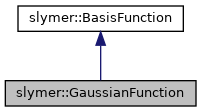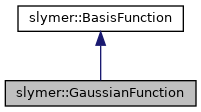A Gaussian basis function used by chemistry electronic structure codes. More...
#include <gaussian.h>


Public Member Functions | |
| GaussianFunction () | |
| Default constructor: Make the function 0. | |
| GaussianFunction (const GaussianType type, const std::array< double, 3 > ¢er, const double expcoeff) | |
| Create an uncontracted Gaussian orbital (shortcut to the more general constructor for Gaussian orbitals). | |
| GaussianFunction (const GaussianType type, const std::array< double, 3 > ¢er, const std::vector< double > &expcoeff, const std::vector< double > &coeff) | |
| Create a Gaussian orbital (uncontracted or contracted) from quantum chemistry codes. | |
| double | operator() (const madness::coord_3d &r) const |
| Evaluate the Gaussian function at the specified point. | |
| virtual double | operator() (const std::array< double, 3 > &x) const override |
| Evaluate the Gaussian function at the specified point. | |
| GaussianFunction | operator* (const double rhs) const |
| Multiply the GaussianFunction by a scalar. | |
| GaussianFunction | operator* (const GaussianFunction &rhs) const |
| Multiply two GaussianFunctions. | |
| GaussianFunction & | operator*= (const double rhs) |
| Multiply the GaussianFunction by a scalar. | |
| GaussianFunction & | operator*= (const GaussianFunction &rhs) |
| Multiply the GaussianFunction by another. | |
| GaussianFunction | operator+ (const GaussianFunction &rhs) const |
| Add two GaussianFunction objects, resulting in a new one. | |
| GaussianFunction & | operator+= (const GaussianFunction &rhs) |
| Add a GaussianFunction to this GaussianFunction. | |
| GaussianFunction | operator- () const |
| Additive inverse of the GaussianFunction (deep copy). | |
| GaussianFunction | operator- (const GaussianFunction &rhs) const |
| Subtract a GaussianFunction from this one, returning the difference. | |
| GaussianFunction & | operator-= (const GaussianFunction &rhs) |
| Subtract a GaussianFunction from this one. | |
| GaussianFunction | operator/ (const double rhs) const |
| Divide the GaussianFunction by a scalar. | |
| GaussianFunction & | operator/= (const double rhs) |
| Divide the GaussianFunction by a scalar. | |
 Public Member Functions inherited from slymer::BasisFunction Public Member Functions inherited from slymer::BasisFunction | |
| virtual | ~BasisFunction ()=default |
Public Attributes | |
| std::array< double, 3 > | center |
| The center of the gaussian. | |
| std::vector< double > | expcoeff |
| The exponent coefficients. | |
Protected Types | |
| using | TermT = std::pair< double, PrimitiveGaussian > |
| Helper class for storing terms in the sum of Gaussian primitives. | |
Protected Member Functions | |
| void | removeSmallTerms (const double eps=1.e-6) |
| Removes terms with very small linear expansion coefficients. | |
Protected Attributes | |
| std::forward_list< TermT > | terms |
| The list of terms in the sum of Gaussian primitives. | |
Detailed Description
A Gaussian basis function used by chemistry electronic structure codes.
This basis function has the form
![\[
\sum_j c_j x^{l_j} y^{m_j} z^{n_j} \exp[f_j(\vec{x})],
\]](form_266.png)
where 
Member Typedef Documentation
◆ TermT
|
protected |
Helper class for storing terms in the sum of Gaussian primitives.
Constructor & Destructor Documentation
◆ GaussianFunction() [1/3]
|
inline |
Default constructor: Make the function 0.
◆ GaussianFunction() [2/3]
| slymer::GaussianFunction::GaussianFunction | ( | const GaussianType | type, |
| const std::array< double, 3 > & | center, | ||
| const std::vector< double > & | expcoeff, | ||
| const std::vector< double > & | coeff | ||
| ) |
Create a Gaussian orbital (uncontracted or contracted) from quantum chemistry codes.
Both Cartesian and spherical orbitals are supported. The expcoeff and coeff parameters must be arrays. If the orbital is uncontracted, the arrays will be length 1.
All uncontracted primitive Gaussian orbitals used underneath the GaussianFunction are normalized.
- Exceptions
-
invalid_argument If a non-positive exponential coefficient is passed or if the lengths of expcoeff and coeff are not equal.
- Parameters
-
[in] type The orbital type (from enum OrbitalType). [in] center The center of the Gaussian orbital. [in] expcoeff Array of coefficients in the exponents of the primitive Gaussians. [in] coeff Array of linear expansion coefficients of the primitive Gaussians.
References center, expcoeff, removeSmallTerms(), and terms.
◆ GaussianFunction() [3/3]
|
inline |
Create an uncontracted Gaussian orbital (shortcut to the more general constructor for Gaussian orbitals).
- Parameters
-
[in] type The orbital type (from enum OrbitalType). [in] center The center of the Gaussian orbital. [in] expcoeff The coefficient in the exponent of the primitive Gaussian.
References expcoeff.
Member Function Documentation
◆ operator()() [1/2]
|
inline |
Evaluate the Gaussian function at the specified point.
- Parameters
-
[in] x The point.
- Returns
- The Gaussian function evaluated at the point x.
References operator()().
◆ operator()() [2/2]
|
overridevirtual |
Evaluate the Gaussian function at the specified point.
- Parameters
-
[in] x The point.
- Returns
- The Gaussian function evaluated at the point x.
Implements slymer::BasisFunction.
References terms.
Referenced by operator()().
◆ operator*() [1/2]
|
inline |
Multiply the GaussianFunction by a scalar.
- Parameters
-
[in] rhs The scalar multiplicative factor.
- Returns
- The scaled GaussianFunction.
◆ operator*() [2/2]
| GaussianFunction slymer::GaussianFunction::operator* | ( | const GaussianFunction & | rhs | ) | const |
Multiply two GaussianFunctions.
- Parameters
-
[in] rhs The right-hand GaussianFunction object.
- Returns
- The product.
References removeSmallTerms(), and terms.
◆ operator*=() [1/2]
| GaussianFunction & slymer::GaussianFunction::operator*= | ( | const double | rhs | ) |
Multiply the GaussianFunction by a scalar.
- Parameters
-
[in] rhs The scalar multiplicative factor.
- Returns
- This GaussianFunction, which has been scaled.
References removeSmallTerms(), and terms.
Referenced by operator/=().
◆ operator*=() [2/2]
|
inline |
Multiply the GaussianFunction by another.
- Parameters
-
[in] rhs The right-hand GaussianFunction object.
- Returns
- This GaussianFunction, which is now the product.
References terms.
◆ operator+()
| GaussianFunction slymer::GaussianFunction::operator+ | ( | const GaussianFunction & | rhs | ) | const |
Add two GaussianFunction objects, resulting in a new one.
- Parameters
-
[in] rhs The right-hand GaussianFunction.
- Returns
- The sum of this GaussianFunction and rhs.
References terms.
◆ operator+=()
| GaussianFunction & slymer::GaussianFunction::operator+= | ( | const GaussianFunction & | rhs | ) |
Add a GaussianFunction to this GaussianFunction.
- Parameters
-
[in] rhs The right-hand GaussianFunction.
- Returns
- The sum of this GaussianFunction and rhs, stored in *this.
References terms.
Referenced by operator-=().
◆ operator-() [1/2]
| GaussianFunction slymer::GaussianFunction::operator- | ( | ) | const |
Additive inverse of the GaussianFunction (deep copy).
- Returns
- The negated function.
References terms.
◆ operator-() [2/2]
|
inline |
Subtract a GaussianFunction from this one, returning the difference.
- Parameters
-
[in] rhs The GaussianFunction to be subtracted.
- Returns
- The difference of the two GaussianFunction objects.
◆ operator-=()
|
inline |
Subtract a GaussianFunction from this one.
- Parameters
-
[in] rhs The GaussianFunction to be subtracted.
- Returns
- This GaussianFunction (the difference).
References operator+=().
◆ operator/()
|
inline |
Divide the GaussianFunction by a scalar.
- Parameters
-
[in] rhs The scalar factor.
- Returns
- The scaled GaussianFunction.
◆ operator/=()
|
inline |
Divide the GaussianFunction by a scalar.
Does not check that the scalar is nonzero.
- Parameters
-
[in] rhs The scalar factor.
- Returns
- This GaussianFunction, which has been scaled.
References operator*=().
◆ removeSmallTerms()
|
inlineprotected |
Removes terms with very small linear expansion coefficients.
- Parameters
-
[in] eps The threshold for "small". Defaults to 1.e-6.
References std::abs(), and terms.
Referenced by GaussianFunction(), operator*(), and operator*=().
Member Data Documentation
◆ center
| std::array<double, 3> slymer::GaussianFunction::center |
The center of the gaussian.
Referenced by GaussianFunction().
◆ expcoeff
| std::vector<double> slymer::GaussianFunction::expcoeff |
The exponent coefficients.
Referenced by GaussianFunction(), GaussianFunction(), and slymer::Gaussian_Functor::special_level().
◆ terms
|
protected |
The list of terms in the sum of Gaussian primitives.
Referenced by GaussianFunction(), operator()(), operator*(), operator*=(), operator*=(), operator+(), operator+=(), operator-(), and removeSmallTerms().
The documentation for this class was generated from the following files: